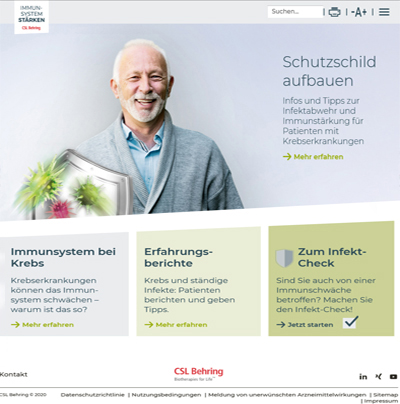Cancer and the associated treatments can attack the immune system of those affected. This can result in an immunodeficiency or acquired immunodeficiency, also known as secondary immunodeficiency. This becomes noticeable through recurring and/or severe infections. The new information and service portal, www.infekte-bei-krebs.de (German only), offers patients, relatives and interested parties a wealth of useful information about acquired/secondary immunodeficiency while suffering from cancer. There is also a wide range of documents available for download as well as an “infection check” to make life easier for patients living with an immunodeficiency. The new website is a CSL Behring initiative.
 A cancer diagnosis is life-changing for patients and their families. If this is compounded by a weakened immune system, frequent infections place an additional burden on those affected, often considerably limiting their quality of life. Sometimes sufferers ask themselves: “It has taken a lot, but now I have the cancer under control (or even defeated), so why do I keep getting infections?” The functions of the immune system and the connection between cancer/treatments and immunodeficiency form an important basis for understanding acquired/secondary immunodeficiency. The new website www.infekte-bei-krebs.de therefore focuses on educating and informing patients and their relatives, and on providing a comprehensive service.
A cancer diagnosis is life-changing for patients and their families. If this is compounded by a weakened immune system, frequent infections place an additional burden on those affected, often considerably limiting their quality of life. Sometimes sufferers ask themselves: “It has taken a lot, but now I have the cancer under control (or even defeated), so why do I keep getting infections?” The functions of the immune system and the connection between cancer/treatments and immunodeficiency form an important basis for understanding acquired/secondary immunodeficiency. The new website www.infekte-bei-krebs.de therefore focuses on educating and informing patients and their relatives, and on providing a comprehensive service.
In addition to explanations on diagnosis and treatment, the site also offers information on hematological diseases such as chronic lymphocytic leukemia (CLL) or multiple myeloma (MM) and other Non-Hodgkin’s lymphomas (NHL), as the incidence of these diseases in cancer patients is particularly high. With the infection check tool, patients can obtain an initial assessment of whether they may also have an acquired/secondary immunodeficiency by answering a few questions. The results of the test can be printed out and taken to your next doctor’s consultation to discuss the next steps.
Experts from the fields of oncology and immunology are also on hand to answer questions about the link between cancer and immunodeficiency and highlight ways in which patients can avoid infections and strengthen their immune system. In addition, the site also gives patient reports on their experiences of acquired/secondary immunodeficiency while also living with cancer and show how they can still actively manage their lives.
The service area of the website gives visitors contact details for self-help groups and associations as well as recommended forums and additional informative websites for patients and relatives. To round this off, the site also offers information material, which is available for download or can be ordered in print free of charge.


